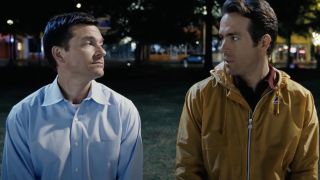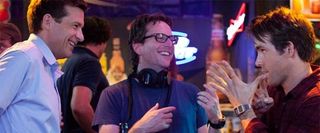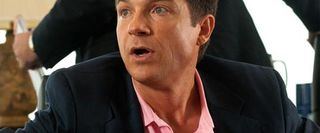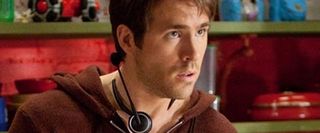Exclusive Interview: The Change Up Director David Dobkin

In 2005 director David Dobkin began a small revolution in Hollywood. While studios spent years believing that audiences weren’t big enough to make R-rated comedies successful, Dobkin’s Wedding Crashers made over $200 million at the domestic box office on a $40 million budget. Fast forward to 2011, when comedies like Bridesmaids, Horrible Bosses, Bad Teacher and The Hangover Part II are cleaning up, and now Dobkin has returned with an R-rated comedy of his own: The Change Up.
A couple weeks back I had the chance to sit down with David Dobkin one-on-one to discuss his newest film. Check out the interview below in which the director talks about the freedom of the restricted rating, working with Jason Bateman and Ryan Reynolds and how he got into filmmaking to make Star Wars.
The first thing I want to ask is, there is a long tradition of body-switching comedies in Hollywood, I’m curious what made you personally want to tackle one?
I honestly never thought in my career I was going to do a body-switching movie. The writers, who I’m friends with, sent me the script and I asked my agents, “What is it?” “It’s a body-switching movie, it’s with a married guy and a single guy.” At first I was like, “Nn..,” but that is kind of interesting. I have not ever seen that, that’s an interesting study. When I read it was laughing my ass off, and when I hit some of the real emotional moments I was like, “Wow, they’ve done a really interesting tonal thing here. They have these big, broad, crazy comedy scenes and they’ve got intelligence.” It’s a real study on men and the intimacy between men, the intimacy between relations with women, sex, and love, and they’ve really, they made it a study of this very, very specific part of our culture. It was legit. I was like, wow, this is legitimate, it is not a retread of anything I’ve ever seen before. And I knew the body-switching thing was going to be a challenge for audiences, because who the hell wants to go see another body-switching movie. Then, the guys are not that polar to each other. It’s a sociological switch. So it was really cool. But it was funny and nobody could deny that.
Was the R-rated element another thing that drew you to it?
I think it’s part of what distinguishes it as totally different than anything that’s ever been done before. I’m very comfortable with an R-rating, I feel like it sounds like what people talk like in real life, I think it’s more real to me. Especially with an adult film. The themes were adult so I felt like, okay, this is good. And it was really, really funny. The Hollywood Forum Press were having a hard time putting it all together, they were like, I was having a conversation with them and they were like, “Why would it be so emotional in a movie like this?” and I was like, “Why not? You know, I don’t understand.”
When you’re directing do you find that the R-rating is actually more freeing? Because you had experience in PG...
CINEMABLEND NEWSLETTER
Your Daily Blend of Entertainment News
I had a very difficult time, you know, as much as I love Fred Claus, I had a very difficult time with the comedy in that movie. I think it’s part of, it’s one of the reasons why, I learned a lot on that movie and it’s one of the reasons why if I was going to go do another comedy, I think when this one came across my desk, I really responded. I would have done anything, PG-13’s probably an easier step than going from R to PG, but I feel very comfortable with R-rated comedy. On the comedy side of what I love as a filmmaker are Richard Pryer, Lenny Bruce, and Eddie Murphy, those are my favorites. Probably none of them, no movie had more impact on me than aside from Star Wars, than 48 Hours. I remember being in the theater during the honky-tonk bar scene and just being like, I could not believe what was going on. That theatrical experience imprinted on me. I believe comedy should be free to go anywhere. I believe that there is tasteful and untasteful, I think they’re very close to each other, and it’s how you handle it tonally. But I’m an equal opportunity offender. I’m happy to go at anything that has a cause to be laughed at. The interesting thing is people will laugh at, I mean people will laugh, I can tell you from testing this movie with audiences many times, they will laugh their heads off, and then afterwards say, “That shouldn’t be in the movie.” And you’re like, “But you’re laughing at it!” I still don’t understand that cause/effect thing, but it’s interesting.

Was there anything specifically?
I mean, the babies. There are people that are just like, “Oh my God, that was hilarious, but it was really inappropriate.” And you’re like, but it’s hilarious, that’s the point, that’s how we got there. Your discomfort is what was the engine that drove the comedy.
Back in 2005 when Wedding Crashers came out it was this massive success, it really seemed like we were on a path for R-rated comedies to finally come back in chic. But it really seems that Hollywood as a whole is still kind of scared, because when you’re cutting it at 18, you’re kind of removing a certain section of the audience, but this summer has been absolutely incredible for R-rated comedies.
You’re cutting off a tiny section of the audience, that’s the thing they just don’t understand. It is a really small, I’m sorry, seventeen and under, and I know the biggest audience is fourteen year old boys or something like that, or I’ve heard that said before, but there is an audience for everything. Tyler Perry can find a fucking audience. Bridesmaids found an underutilized, ignored, completely overlooked section of the audience, to the tune of a hundred and sixty million dollars now. That’s good enough for any property to make those kinds of numbers. And so, trying to be broad because you think you’re getting more money often does the opposite. Getting really, nailing something tiny and specific like The Full Monty can break out and make a lot of money. I just think filmmakers all share the point of view that I share, most of them, I know Judd does and I know Philips does, which is just, be true to your story, true to your movie, and make a great movie. Let the audience that shows up for the movie show up. I get very scared when I hear people go, “They love those kinds of movies.” There is no “those kinds of movies,” that’s your nightmare to hear a marketing department say that. Just this summer alone, you had Bridesmaids, Bad Teacher, Hangover 2. You know what happened, Wedding Crashers came out, 40 Year-Old Virgin came out, everybody was like, “Okay, that was a summer for R-rated comedy.” A couple of other comedies tried it, they did it really small, they pulled punches, some of them did good, and then Hangover came out. Once you kick down the door the way that Hangover did, forget it. Hollywood can’t, in the sense of corporate responsibility, ignore the numbers that Hangover did. At that point in time, I believe it was post-Hangover, all of this stuff started to go. Now what you’re seeing is, these movies are getting made.

So you’re saying this is kind of the start of a different wave?
We’ll see, yeah. Who knows how long it goes or how long it doesn’t go, but it’s certainly what, I mean, this summer has been pretty astounding. That opening for Bad Teacher was phenomenal. I was shocked and happy and really thrilled for Jake. I was of course completely blown away by Bridesmaids, I could not believe, I was speechless when I walked out of the premiere. I was like, I called Judd the next day and I was like, “You did it man.” Everyone’s been trying to break through in the female raunchy comedy thing, and what you did is you embraced it’s feminine side. You didn’t do The Sweetest Thing. Then Horrible Bosses was a great idea, great concept, great hook, great time for it. It just, that movie has a synergy and it’s brilliant. And Seth’s a great filmmaker, he just finally got a moment. And we’ll see. Hopefully we’ll be able to overcome what looks like a familiar movie to people so that they can get to the theaters and see that we did it in a way that really will break your expectations, I hope.
Just the cast members, the front two guys alone, you have to have this huge appeal. That’s something I’m curious about is, when you were looking for your two main guys, were you looking for actors with certain mannerisms that could play off of each other?
No, they just did a good job with that, honestly. I was just looking for, I did a thing where I looked for actors that fit the character, but roles that are gonna do things that they have never done before. I don’t, it wouldn’t be fun, let me put it this way, it wouldn’t be fun to take an irreverent character/actor, pretend that he’s the married guy so that he can then become the irreverent guy you know him as. That’s boring. But taking the guy that you know is Jason Bateman and turning him into the raunchiest, most out of control dude, it’s funny. To me that’s funny, there’s an event to that, the performance should be the event. Same thing with Vince in Wedding Crashers, it was an event to see him finally take Trent and all these other different things that he had and he fucking had this one moment where he just like, that character was perfect for him and he fucking tore it apart and went the distance. He burned the house down. You look for those moments. This one was an amazing opportunity for Jason and for Ryan, because Ryan has super sick crazy talents. Aside from being a very talented, great actor, he’s got comedy talent. Everyone knows that. His visible comedy is insane. He is like, not a lot of good-looking guys can do this performance, you know what I mean? It’s the same thing with Cameron Diaz as a woman, she can do physical comedy and she’s hot. It doesn’t always come together like that for some reason, I don’t know why. But that role, that he’s going to turn from the Van Wilder, the guy we’ve kind of seen him do, into this sweet, puppy dog, wide-eyed innocent dude who gets put through the ringer and all this stuff, is really cool and he’s got the skills as an actor, he just never had the platform. Now all of a sudden you’re seeing it and it’s just delightful to see him. On something as simple as a dinner date, he’s playing a guy who’s completely insecure.

Actually, the thing when I first heard about this project, I don’t know if you know about this, but when Ryan Reynolds was still doing Two Guys, A Girl, and a Pizza Place, there’s this one Halloween episode where he switches brains with Traylor Howard and he also just totally rocked it.
I didn’t know that, yeah that’s amazing.
I definitely saw the omens here too because he really, you really look at him and you see Jason Bateman’s personality coming out of him.
Yeah, these guys did a really good job. As hard as we worked on it, and kind of half shot from the hip and half making sure we were studying it as we went, because you do things, like Ryan spat out “fucknipples.” I was like “Oh shit, alright.” We’re partway through the shoot, but that’s really funny. Then you’re trying to figure out places to put fucknipples in. And so as you’re making the movie, things are getting put into cement as you’re going, and you’ve got to start answering and echoing that stuff on the other side whenever you have a chance. There’s just the right amount of it to keep it, every once in a while you need those little reminders, but overall the performances are so clean. In the script it was amazing. The switch, the switch worked in the script immediately because the characters were so consistent in their point of view.
That’s another question I want to ask. With comedies there tends to be a broad range from the initial script and the final cut. How similar were those two versions?
This movie is ninety percent that script. It is the most astounding percentage of a script to a finished comedy. There is a good ten percent that Jason and Ryan have lines and ideas, or lets say it’s eighty percent the original script, but it’s a lot. I mean, I can tell you structurally, almost scene for scene through most of the movie. There’s a couple of additional scenes here and there and a new ending, the writers came up with that ending, stuff like that.
What was the original ending?
There was an ending where they went to a warehouse originally, and they had to pee in front of all of the workers there. But they had the idea of putting it in a shopping mall. And we shot something different from that, there was one where they show up and the fountain is broken, and Mitch gets angry and pushes her over, and then she breaks it, then they piss on her head, they don’t know if it worked or not. That’s the one that we shot, it was really funny. But then the writers were just like, “Oh wait, we have a really good idea,” one day. And I went to the studio and was like, “I think this is worth it. This is crazy.” And it’s more related to the original script idea. They went for it.

The studio, were they always cool...This is obviously the same studio that brings us the Judd Apatow movies, so I’m curious, were they always on board for this to be a rated-R film?
Yeah, absolutely, they bought it on spec and it was rated-R and it was racy. They knew it, they had a good handle on it. Adam Fogle seemed really for this movie from the beginning, Don was very supportive. They were a really good team.
Is there anything that you personally thought was ever crossing a line? You mentioned that you’re an equal opportunity director?
No, I do. I wait and I hear stuff. I wait and hear. The speech that Mitch gives later in the movie used to be a sort of a Catholic girl/Jewish girl but I had already taken Jew joke earlier so I figured I’d mix it up a little bit, little adjustments like that. There’s a line where a joke is mean, you’re not going to see mean jokes in my movies. Even when a character may be saying something that’s racially derogatory, it’s from a character that doesn’t know better and in a way that clearly he doesn’t understand. There’s a huge difference between that and saying something that is mean. That boy in the bubble movie pissed me off, I thought it was really fucking inappropriate and hurtful. There was some script about the special Olympics that went around at some point and I was like, “This is fucked up, you guys.” It’s not funny. There’s a lot of people that don’t know what’s really funny or not, they really don’t understand the line. There’s a way to do things that are challenging but they’re classy. I hate to say it but in it’s own way, we make jokes about everybody in this movie, but I don’t think we’re out to hurt anyone or to be mean. I think we’re saying there’s a stupid character, and he’s dumb, and you get that. The audience goes crazy and they laugh at it. Mean jokes don’t fly, they really don’t fly. You don’t want to say, look I don’t even use some of the words in real life that are not even bad words, but I would never say some things Mitch says, even right now. I won’t say what he says about the babies in the kitchen, but I know that it is character and it’s funny. It’s not a cheap joke, it’s actually teaching you about how stupid this guy is and how inappropriate it’s going to be for him to have to take care of children later in the movie. Part of the reason you’re like, “Oh my God,” is because this guy, “What’s your name? What’s your name?” Why doesn’t he talk?” you know, he’s that stupid. I love that about it.

It just also kind of sets up a place for him to go because he has to develop.
It’s good storytelling. I don’t have any gratuitous sex. I don’t have any gratuitous stuff in that way. I guess that’s the distinction. But based in that, I trust myself not to go over the line and I’ve never had to have an audience tell me that. I’ve had audiences when I’ve tested it, I’ve seen where I’ve gone far enough that they really are uncomfortable and they don’t want to be there any longer. There’s a cut of the “lorno” [Note: means “light porno] that was about three steps too far. It just was like, how long do you want to look at that? That’s all it was. It was just like, alright, that stuff has to be shorter, it all has to come out, I don’t really need to see that dude’s naked ass, you know what I mean? There was a shot that I can’t even, you’ll see it on the DVD and it will scar you. We didn’t end up losing any beats. There was nothing like, oh this has to come out, in fact, it didn’t run well. We tried. We looked at it, we tested it, you’ve got to for the studio. They’re actually like, yeah, it’s funny when you see...
So would you say that when the movie comes to DVD with those extra things, would you personally call that a director’s cut? An extended edition?
No. This is a director’s cut. I’ve been very lucky, my cuts have always made it into the theater. I’m fortunate in that way. I think a lot of directors end up with their cuts in the theater. But mine, the movies that work and test high, like this movie, you get to keep what’s in there. That’s part of the fun. I keep likening it to, like, don’t go white water rafting if you don’t want to get wet. The difference between some of the reviewers is it’s their job, they have to go see this movie. They may sit in the movie theater and go, “I don’t want to see this.” The question is, would you have bought the ticket on your own? If you did and you don’t like it, then I respect that. And I respect all opinions, by the way. The truth is, we tested this movie many, many times, and the number of complaints we got out of any theater from sized 300 to 400, that any individual moment was never more than two people. Which was shocking to me. I really thought at some point everyone was going to, there was going to be something they would all pile onto and say, “No way, no way, no way, no way.” There was nothing in the movie that didn’t have more, “this is our favorite” scenes. It’s a very polarizing movie, by the way. There’s no question about it. But I guarantee you, any moment that you can ask me, that’s what we call a spike moment, like a high point, had two-thirds positive, “That’s my favorite” next to one-third, “That’s really a little too far.” So it was really, they’re all different. Even inside the studio, at the end it was just like, they said this funny thing like, “We all disagree about what it is that you should keep or not keep, so why don’t you just...and you’re getting laughs on everything, so just keep it.”

What do you have coming up next?
I start this week on a script that I wrote of a re-envisioning of King Arthur from Warner Brothers. We start Tuesday. We start working on that, and we are crewing up and starting the cast for that movie.
Are you taking a parody approach to it?
It’s not comedy. It’s Star Wars. It is more of a mythic, retelling of a myth. It’s reinvented in a way that I always wanted to do it. It’s got one foot in Sherlock Holmes, one foot in Lord of the Rings, I guess. It’s really cool.
Have you been wanting to stretch yourself into drama for a while?
I’ve been generating this material for a long time. I’m a producer on this movie Jack the Giant Killer that Bryan Singer is doing, I had developed that five years ago for myself to direct. I came to Hollywood to make Star Wars and I never really, I got into comedy and it was fun, and it remains fun. Then I developed this movie R.I.P.D. that Ryan is now in. I developed all of this from page one, from zero, because in different timings or my availability, I wasn’t always available when those movies went. So this one I wrote for myself.
Do you have any idea of casting at this point?
It’s going to be, probably unknowns. All British cast. So we’ll see what happens.

Eric Eisenberg is the Assistant Managing Editor at CinemaBlend. After graduating Boston University and earning a bachelor’s degree in journalism, he took a part-time job as a staff writer for CinemaBlend, and after six months was offered the opportunity to move to Los Angeles and take on a newly created West Coast Editor position. Over a decade later, he's continuing to advance his interests and expertise. In addition to conducting filmmaker interviews and contributing to the news and feature content of the site, Eric also oversees the Movie Reviews section, writes the the weekend box office report (published Sundays), and is the site's resident Stephen King expert. He has two King-related columns.
Most Popular




